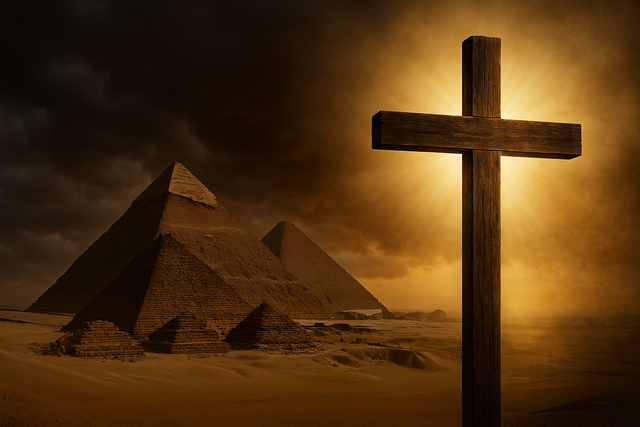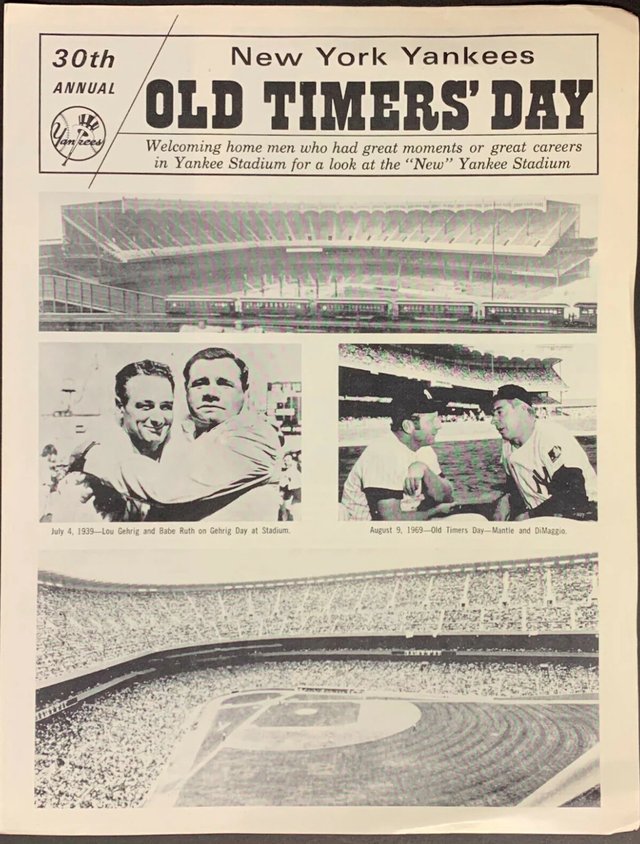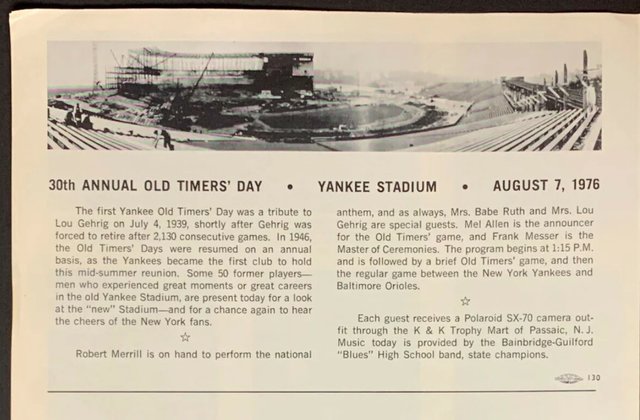“Dynasties Fade, Landmarks Remain” From Babel to the Bronx
If They Had Been Mindful
Texts: Proverbs 22:28; Romans 15:4; Hebrews 11:15–16 (KJV)
Introduction: Baseball and the Illusion of “Ancient” History
I have been a Yankees fan all my life. The franchise took the field in New York in 1903 (as the Highlanders) and adopted the name “New York Yankees” in 1913. From those early days to the present, the Yankees have piled up 40 American League pennants and 27 World Series championships. People speak of the Yankees as a dynasty—and they are not wrong.
And yet when I was young, I remember seeing the widows of Babe Ruth and Lou Gehrig seated at Yankee Stadium on Old-Timers’ Day.
I remember the old ballplayers—some who had shared the diamond with the legends of Murderers’ Row—walking onto that same field. Today you can pick up a World Series history and flip year by year from the early 1900s to now—and a good portion belong to the Yankees. Still, no one roster stayed the same for long: stars rose and faded; players were traded; some went off to war; all of them aged and many of them passed away. Several “dynasties” lived and died—within a single century.
I say that to say this: we often do not grasp how much change can happen in a short span of time. If a baseball club can cycle through eras and icons in a hundred years, then when you open your Bible and read three or four centuries compressed into a genealogy—from the Flood to Abraham—you should not imagine a slow trickle. Empires were forming, languages scattering, idols multiplying—and it was all happening while patriarchs who remembered the Ark were still alive.
Not Just Baseball: How Fast Empires Rise and Fall
If baseball seems trivial to you, widen the lens. How long did the Inca Empire truly last? Barely a century—then it fell. How quickly did the Spanish overthrow the Aztecs, and the remnants of Mayan power that had spread across Mexico and Central America in only a few hundred years? Consider the Iroquois Confederacy on our own continent—an ascendant power that rose, dominated, and declined within a narrow window of time.
Look across the oceans: empires in Europe and Asia—Greece and Rome, Assyria and Babylon—each rising and falling in mere centuries. Think of the Mongol whirlwind under Genghis Khan sweeping across Asia in the 1200s, leaving descendants scattered among vast populations even today. And even mighty China, which speaks of five thousand years of history, is a tapestry of dynasties: regimes rising and collapsing, retelling the past to make their moment seem eternal. Many modern revisionists dismiss the Word of God because they cannot imagine civilizations forming and changing so quickly. Yet the “cradle of civilization” acknowledged in secular textbooks does not reach back beyond what Scripture places within human memory after the Flood.
History is shorter and more fragile than we pretend. The Bible’s record matches what we see: in only a few centuries, nations can be born, flourish, corrupt themselves, and fall.
Remember the Landmarks
“Remove not the ancient landmark, which thy fathers have set.” (Proverbs 22:28)
In Abraham’s day, the landmarks were not ruins overgrown with ivy; they were living memories. Shem still lived. Eber still lived. Men who had walked off the Ark with Noah were alive while nations formed and scattered from Babel. The Flood stood as God’s landmark of judgment; the Ark as His landmark of salvation; Babel as His landmark warning against man’s pride. Yet their children forgot. They “removed the landmarks”—not by digging up stones, but by refusing to remember the God who set them.
We also have landmarks today: the infallible Word of God; the blood-stained cross; the testimonies of the saints who have gone before. When we neglect them, we repeat the same decline.
These Things Were Written for Our Learning
“For whatsoever things were written aforetime were written for our learning, that we through patience and comfort of the scriptures might have hope.” (Romans 15:4)
In Abraham’s generation, even the kings of the nations were not yet fully hardened. When Abram went down to Egypt, the LORD intervened, and Scripture says,
“And the LORD plagued Pharaoh and his house with great plagues because of Sarai Abram’s wife.” (Genesis 12:17)
Pharaoh heeded the warning and released Sarai. Similarly, when Abraham came to Gerar, God spoke to Abimelech in a dream:
“But God came to Abimelech in a dream by night, and said to him, Behold, thou art but a dead man, for the woman which thou hast taken; for she is a man’s wife.” (Genesis 20:3)
“And God said unto him in a dream, Yea, I know that thou didst this in the integrity of thy heart; for I also withheld thee from sinning against me.” (Genesis 20:6)
Abimelech listened—and God restrained him from sin. But a few centuries later, in Moses’ day, Pharaoh hardened his heart again and again, till judgment fell. The lesson is clear: the same God who warns in mercy will judge in righteousness when men refuse to heed.
If They Had Been Mindful
“And truly, if they had been mindful of that country from whence they came out, they might have had opportunity to have returned. But now they desire a better country, that is, an heavenly: wherefore God is not ashamed to be called their God: for he hath prepared for them a city.” (Hebrews 11:15–16)
The nations around Abraham were not far removed from Noah; they had memory and testimony—but they were not mindful. They did not retain God in their knowledge. Abraham, by contrast, was mindful: he heard God’s call, left Ur, and sought a city whose builder and maker is God. The difference is not time but trust; not centuries but the heart.
The Warning in the Paradox
Here is the paradox: in our world, with life expectancies of seventy or eighty years, nations still rise and fall in a few generations. In Abraham’s world, where patriarchs lived centuries, decline still came—in the very presence of men who remembered the Flood. Long lives did not preserve righteousness; short lives do not excuse unrighteousness. The issue is always the heart’s response to God’s truth. Will we remember the landmarks? Will we be mindful of His Word?
Conclusion: Our Learning, Our Hope
Dynasties rise and fade. Empires come and go. Baseball legends pass into grainy film and faded scorecards; nations etch their names into stone and then weather into dust. But the promises of God stand. Therefore—
Remember the landmarks. “Remove not the ancient landmark, which thy fathers have set.”
Receive the Scriptures. “Whatsoever things were written aforetime were written for our learning.”
Be mindful of the better country. “God is not ashamed to be called their God.”
Abraham trusted, and God preserved him in the midst of a world already turning aside. He will preserve all who walk by faith—today.
Invitation: Beware of Nostalgia—Be Mindful of the Better Country
It is tempting to live on memories—and equally tempting to chase “new” truths that are nothing but old sins dressed in fresh leaves. After Babel, when God scattered the nations, imagine the sons of Mizraim arriving in Egypt and looking up at vast monuments—stone that seemed to whisper of immortality. Whether those works were inherited or imitated, men soon built legends to place themselves at the center of the story. A Sphinx staring back, pyramids piercing the sky—yet the living witnesses to God’s truth were still among them. Shem still lived. Eber still lived. But instead of heeding the patriarchs, they curated nostalgia into religion and rewrote wonder into idolatry.
“By these were the isles of the Gentiles divided in their lands; every one after his tongue, after their families, in their nations.” (Genesis 10:5)
“And hath made of one blood all nations of men for to dwell on all the face of the earth, and hath determined the times before appointed, and the bounds of their habitation; That they should seek the Lord, if haply they might feel after him, and find him, though he be not far from every one of us.” (Acts 17:26–27)
God fixed the bounds for a merciful purpose: that men might seek Him. But man prefers to resurrect the “golden calves” of sentiment: Gaia dressed up as science, pyramid mysticism repackaged as wisdom, the rites of druids rebranded as roots. Nostalgia can be a sanctified memorial when it points to the Lord; it becomes an idol when it replaces Him. The charge still stands:
“Remove not the ancient landmark, which thy fathers have set.” (Proverbs 22:28)
Some say, “We would never fall for the lie of Antichrist.” But the Scripture warns about a coming delusion when the restraining hand is taken out of the way.
“For the mystery of iniquity doth already work: only he who now letteth will let, until he be taken out of the way.” (2 Thessalonians 2:7)
Seven swift years will run their course; then a thousand years of Christ’s reign; and at the end, a final insurrection is crushed by the Word of Him who is eternal (Revelation 20). Kingdoms rise; empires fade; even our most cherished “dynasties” pass into dust. What endures is not mother earth, nor some resurrected druid, nor even the New York Yankees—it is the Lamb that was slain.
Friend, the call tonight is simple and searching: be mindful. Not of the myths, but of the mercy. Not of the idols, but of the landmarks. Not of the latest spiritual fashion, but of the old rugged cross—the once-for-all sacrifice of the Son of God, two thousand years ago, for sinners like us.
“Moreover, brethren, I declare unto you the gospel which I preached unto you… how that Christ died for our sins according to the scriptures; And that he was buried, and that he rose again the third day according to the scriptures.” (1 Corinthians 15:1, 3–4)
Will you come to Christ? Put away the counterfeits and the comforts of nostalgia. Believe on the Lord Jesus Christ, and thou shalt be saved. Remember the landmarks—His Word, His Cross, His empty tomb—and be mindful of that better country. Come while He calls.
Suggested Prayer
“Lord, I confess I have trusted in many things—memories, myths, and myself. I turn from my sin and believe that Jesus Christ died for my sins and rose again. Save me, cleanse me, and set my heart on that better country. Make me mindful of Your Word, and keep me from idols. I receive the Lord Jesus as my Savior and my King. Amen.”
If you prayed to trust Christ, or if you have questions about salvation, please reach out tonight. Let’s open the Scriptures together and settle it from God’s Word.


